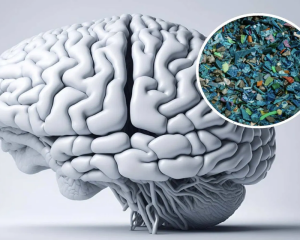While scientists don't fully understand the health impacts of MNPs in the brain, they are calling for more research to better understand whether they are harmful.
虽然科学家们尚未完全了解纳米塑料在大脑中的健康影响,但他们呼吁进行更多研究,以更好地了解它们是否具有危害。
Studies have shown MNPs in arteries can be a risk factor for cardiovascular disease, and that cancer cells in the stomach can spread faster after contact with MNPs.
研究表明,动脉中的纳米塑料可能是心血管疾病的风险因素,而胃中的癌细胞在与纳米塑料接触后可能会更快扩散。
"More and more studies show that plastics are present in the brain, including this new one, and they shouldn't be there," says Kasteel.
卡斯特尔表示:“越来越多的研究表明,塑料存在于大脑中,包括这项新研究,但它们不应该在那里。
"We don't know that much about the health effects, but the fact is that they are there and they shouldn't be there, and maybe that's worrying enough."
我们对健康影响知之甚少,但事实是它们确实存在,而且不应该存在,这可能已经足够令人担忧了。”
Campen's research team wants to look at the whole brain next, to understand if there's more plastic accumulation in one specific area, and to see if that links to any specific health outcomes.
坎彭的研究团队希望下一步研究整个大脑,以了解是否存在某个特定区域的塑料积累更多,并观察这是否与特定的健康结果有关。
While there is no way to completely avoid exposure to plastics, Kasteel says that on a personal level there are small choices you can make that can reduce exposure:
虽然无法完全避免塑料暴露,但卡斯特尔表示,在个人层面上,可以通过一些小的选择来减少暴露:

minimizing single-use plastics, ventilating your home well and vacuuming regularly to remove dust and plastic debris, and avoiding cosmetic products that intentionally add MNPs like scrubs with plastic beads.
尽量减少一次性塑料的使用,保持家中通风良好并定期吸尘以清除灰尘和塑料碎片,避免使用添加纳米塑料的化妆品(如含有塑料颗粒的磨砂膏)。
Scientists are also developing solutions to reduce microplastics in the environment.
科学家们还在开发减少环境中微塑料的解决方案。
There's a type of worm that eats polystyrene, and fungi and microbes that break down plastics in the environment
例如,有一种蠕虫可以吃掉聚苯乙烯,还有真菌和微生物能够分解环境中的塑料。
Scientists are developing new types of filters to remove MNPs from drinking water.
科学家们正在开发新型过滤器,以去除饮用水中的纳米塑料。
"Plastic is everywhere. Most people cannot imagine a world without plastic, even if we stop producing plastic right now, the world will still be full of microplastics," says Kasteel.
卡斯特尔说:“塑料无处不在。大多数人无法想象一个没有塑料的世界,即使我们现在停止生产塑料,世界上仍然会充满微塑料。
"So it's good to think about mitigation measures, applying a precautionary principle, and seeing what we can do to minimize exposure, to maybe prevent certain health risks that there might be."
因此,考虑缓解措施、采取预防原则,并看看我们能做些什么来减少暴露,可能是预防某些潜在健康风险的好方法。”













